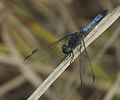| Dragonlets | |
|---|---|
 | |
| E. umbrata, Band-winged dragonlet, Jamaica | |
| Scientific classification | |
| Kingdom: | Animalia |
| Phylum: | Arthropoda |
| Class: | Insecta |
| Order: | Odonata |
| Infraorder: | Anisoptera |
| Family: | Libellulidae |
| Subfamily: | Sympetrinae |
| Genus: | Erythrodiplax Brauer, 1868 |
| Type species | |
| Erythrodiplax diversa | |
Erythrodiplax is a large Neotropical genus of dragonflies in the family Libellulidae. These small to medium-sized skimmers are commonly known as dragonlets. [1]








